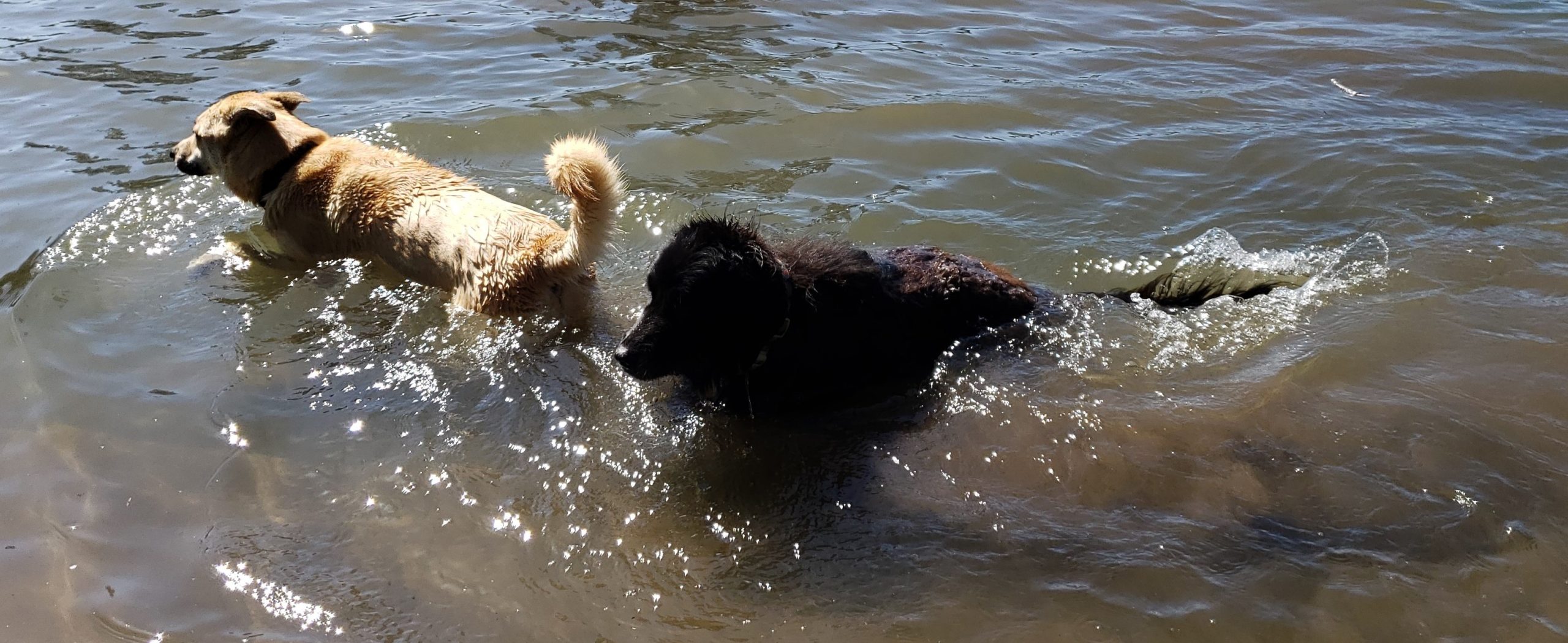My pups have taught me about using unpredictability in writing as well as being open to surprise. As my friends, Deborah and Frank, and I headed out for a scenic walk, I didn’t expect that I would wind up with a lesson about pacing in writing.
The Deschutes River never disappoints. Less than 20 minutes from home and just a minute from the car, my pups were paddling in an eddy and chasing sticks in the water. After five more minutes of frolicking, the four dogs in our group launched themselves on the trail heading upriver. On our left, every few turns on the trail offered four-legged access to the river or a meeting with another group of hikers, usually with canine companions. On our right, the forest provided my two pups, Sophie and Misha, along with Misha’s sister, Harley, and their doggy friend Noodle, its usual sniffing and hunting opportunities.
With the foursome on their best behavior, we humans admired Lava Island, the result of a lava flow that forces a temporary split in the Deschutes, and commented on the river’s variable moods that move from serene to turbulent and back. We could have walked all afternoon, but when you have a 13-year-old dog with a heart condition in the mix, you just can’t. So, we stopped just past a bend in the river to give her a rest before turning back, watched the cloud-streaked sky, listened to a woodpecker drumming on a pine to attract a mate, and let the sun soak in. As we headed back downstream, my aging Sophie’s joyful prance filled my heart with unclouded happiness.
“That’s what you get for eating grass,” I called out upon hearing her familiar gagging cough shortly thereafter. She coughed again. “See?” I lectured. Then I heard it for a third time. Something wasn’t right. I looked back just in time to see Sophie lurch to her left, jerk as if she was having a small seizure and collapse.
I’ve lost three dogs in the last few years, all at age 14. They were all with me as I bolted over to sit next to Sophie on the pine needles and dirt. Channeling my doggy-emergency self, I petted and soothed her as I eyeballed the flannel shirt around Deborah’s waist and imagined turning it into a drag sled using the poles we’d just seen in a waterside shade structure that someone had built.
When Sophie seemed recovered, I helped her to her feet, half expecting her to crumple again. Instead, she wagged her tail and, after a few faltering steps, trotted on as if nothing had happened. I was not so sanguine.
I had barely regained a semblance of composure when my two-and-a-half-year-old pup, Misha, and his sister, Harley, jumped in the water to chase a duck. The siblings’ hunting prowess on the water is just as bad as it is on land, which usually is a bonus. This time, however, swimming after the duck took them straight toward white water.
I started to run toward them, and Sophie took off after me. That wasn’t going to work. Torn between keeping her safe and rescuing the other two, I threw her leash to Frank and raced ahead to a spot that would allow me to get to the riverbank since our trail had strayed into the forest.
“Come! Puppies, come!” I yelled again and again and again. By the time the pups finally decided to listen to me, it was too late. They were no match for the current that had picked up and quickly washed them out of sight.
Fortunately, one of the four waterfalls on this stretch of river was still a good half a mile away, and this particular white water was quite a bit less intense than others we had passed.
“I got ‘em!” Deborah, who had run on ahead, yelled a very long minute after I’d lost sight of the pair.
Yup. A perfect example of pacing in writing—not all mellow and lovely, nor all fast-paced and crazy, but rather a tense balance between the two. Of course, it took a while for my adrenaline levels to return to their normal state, but that’s real-life rather than a book.




















0 Comments